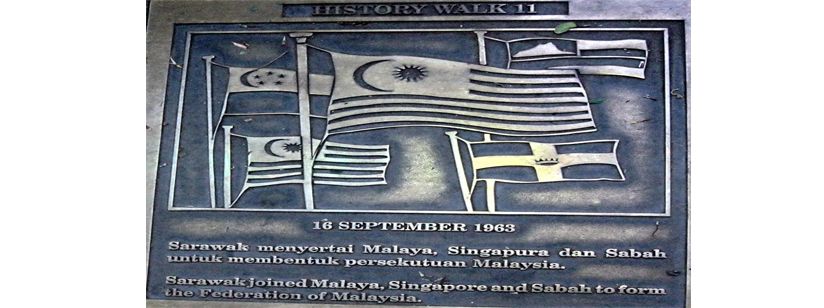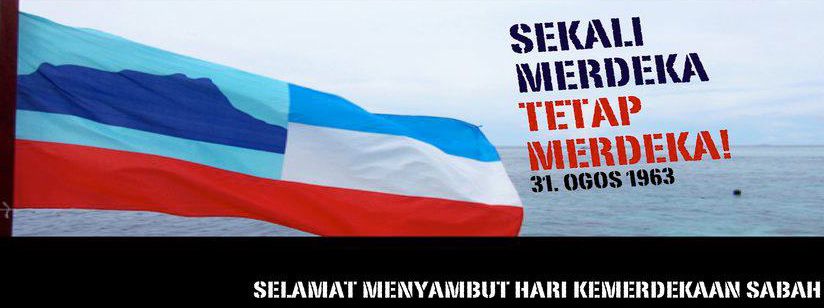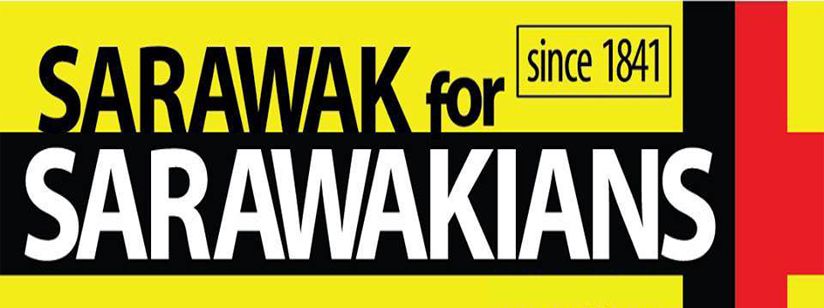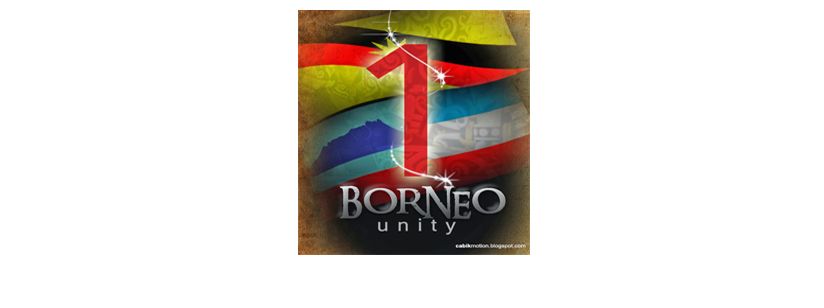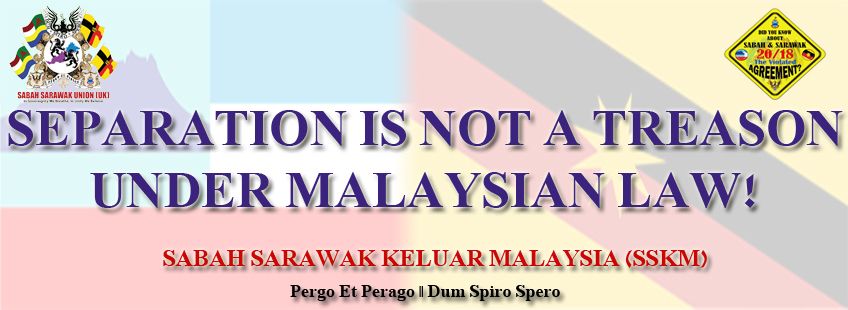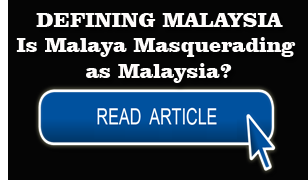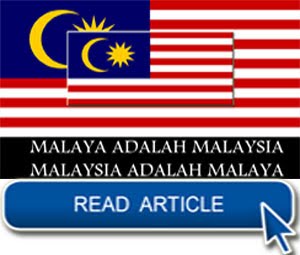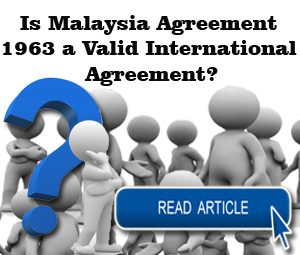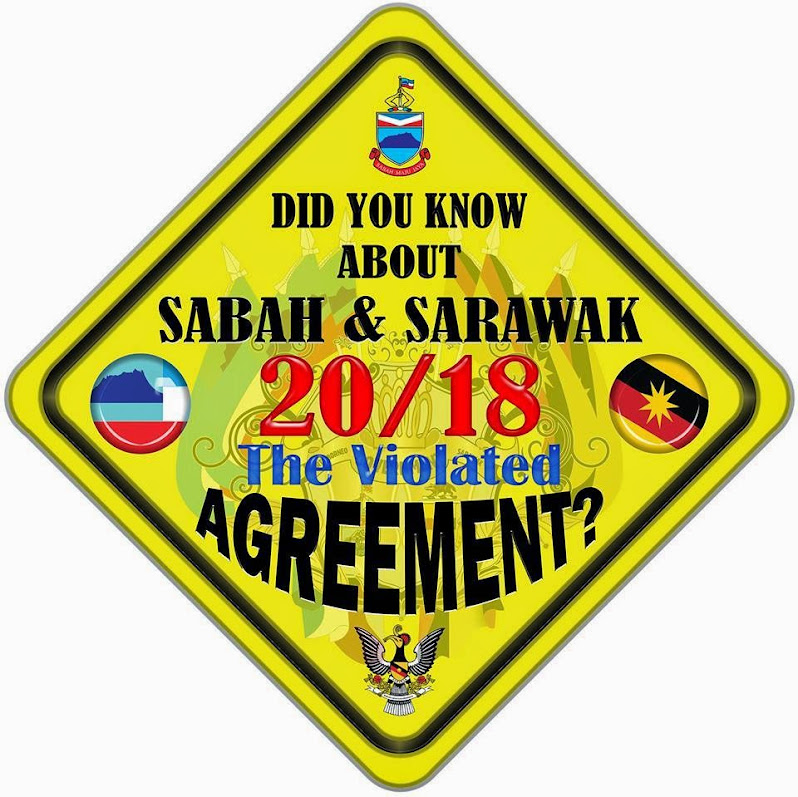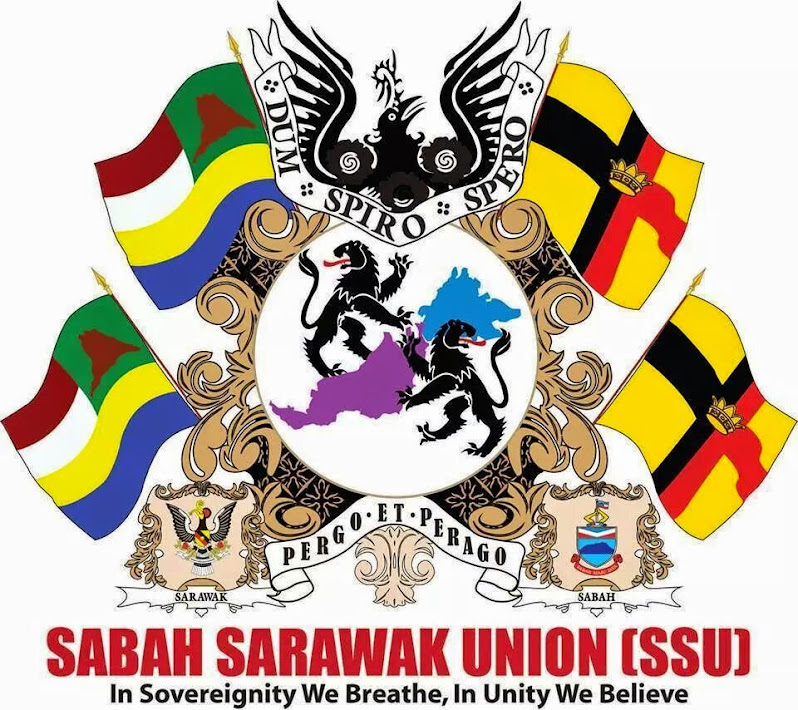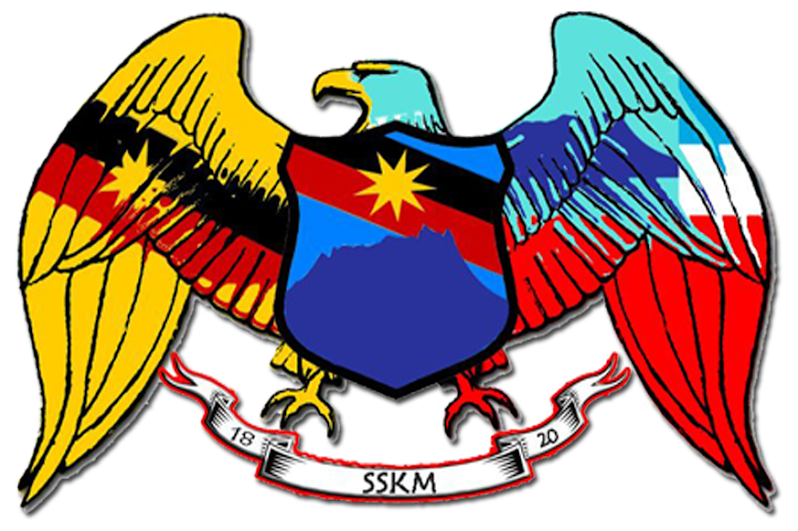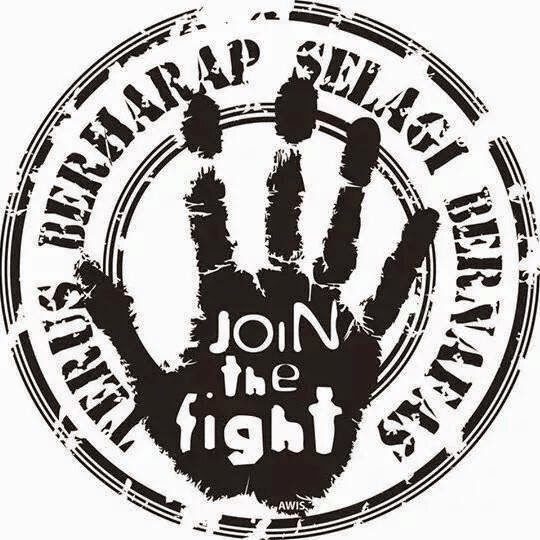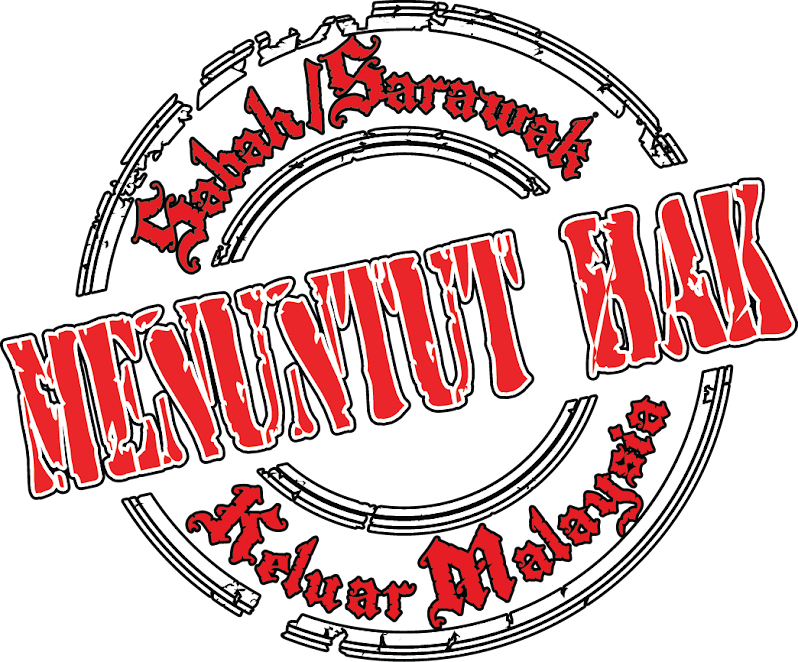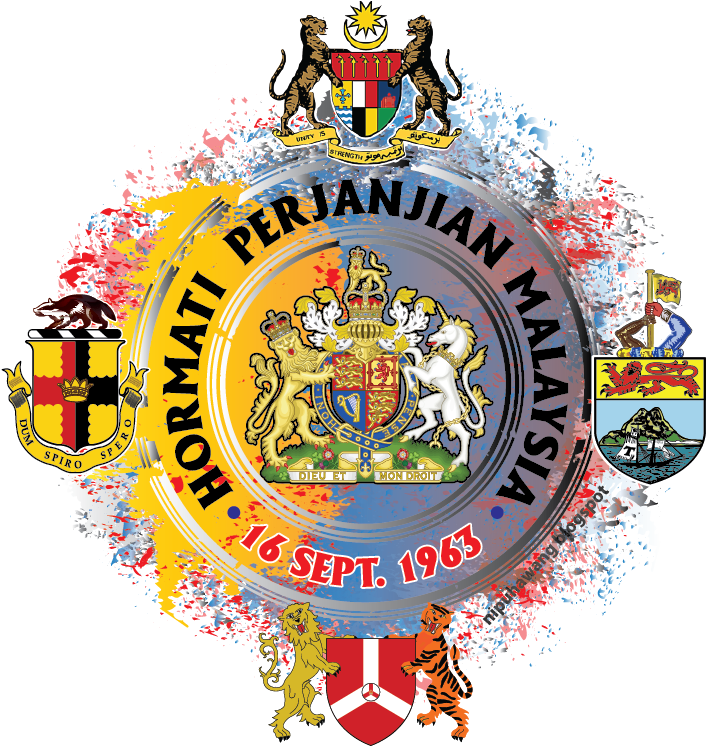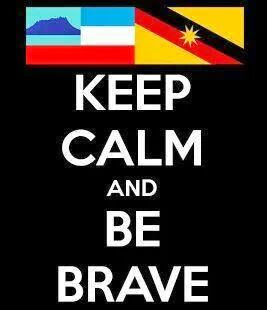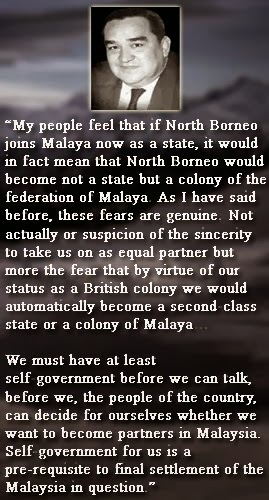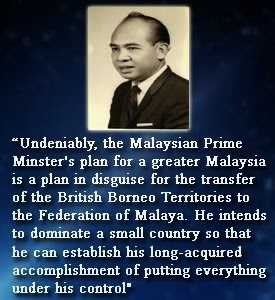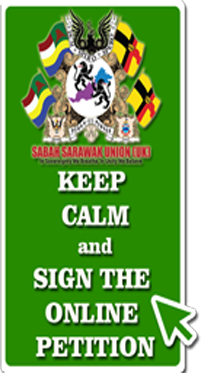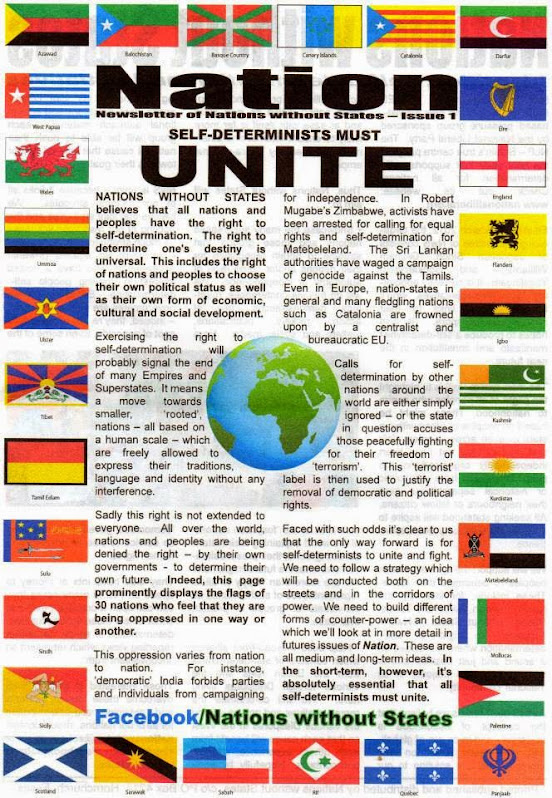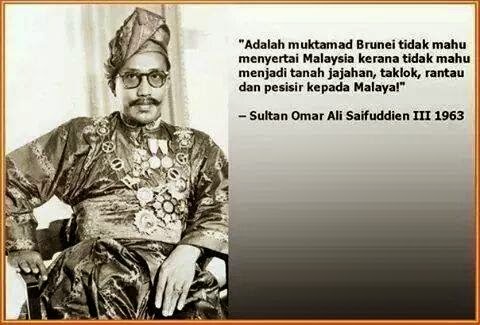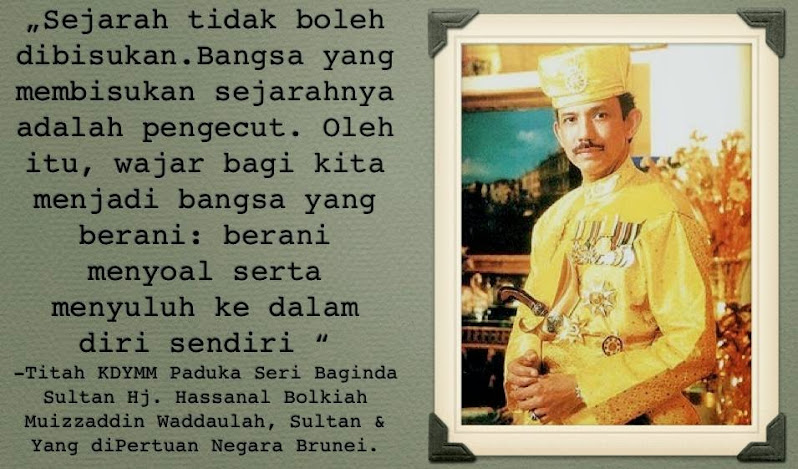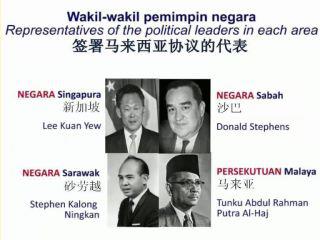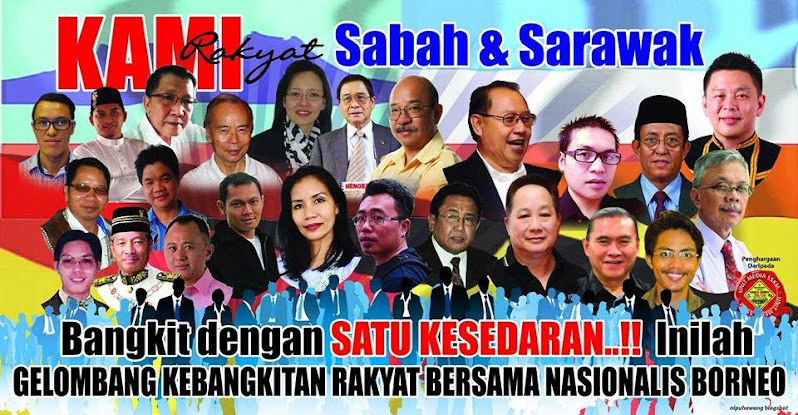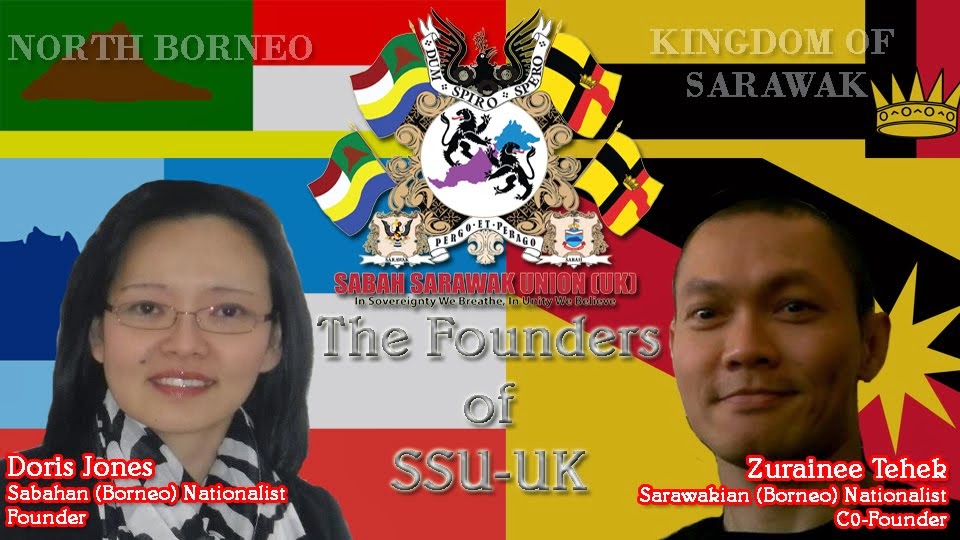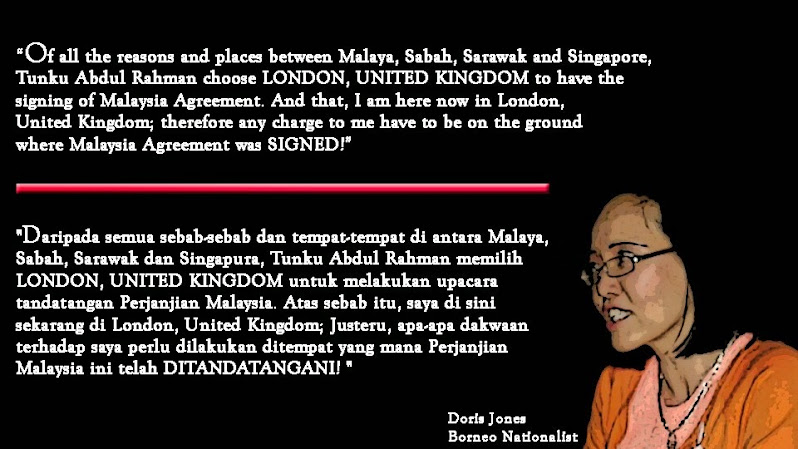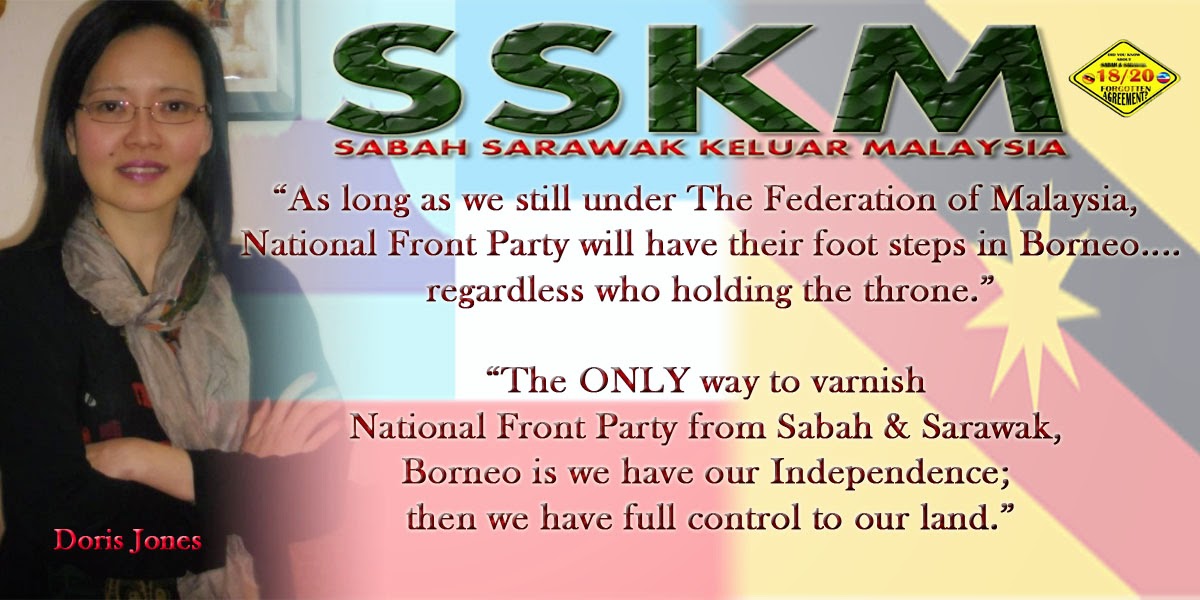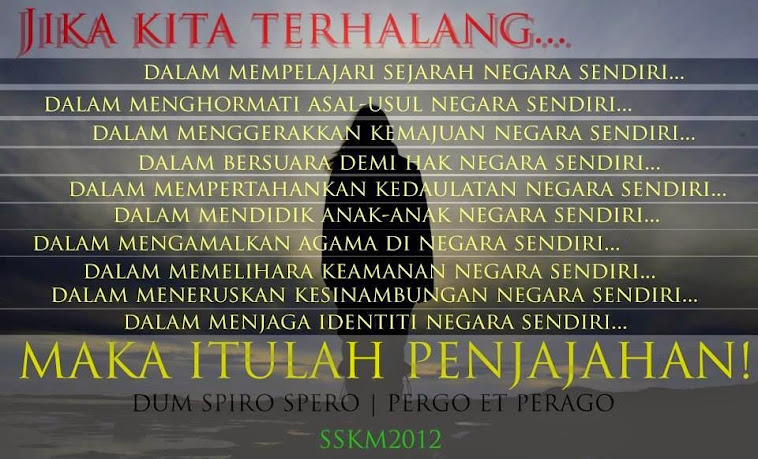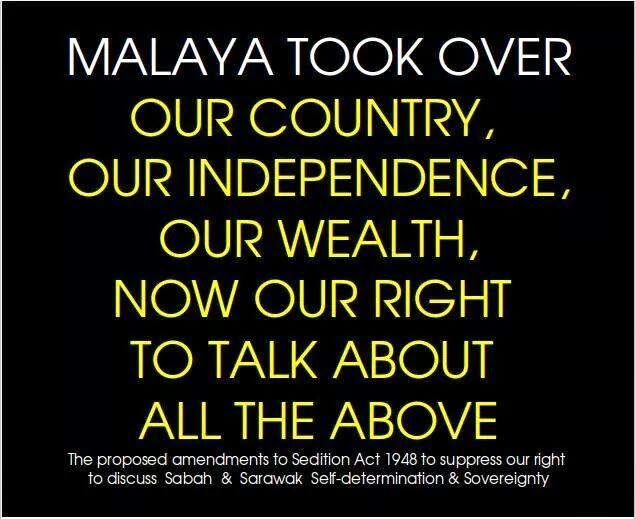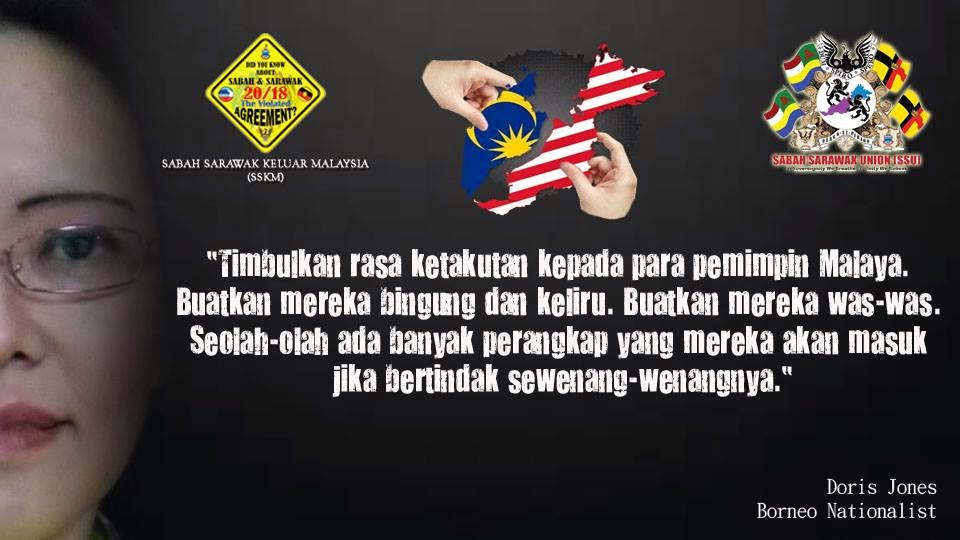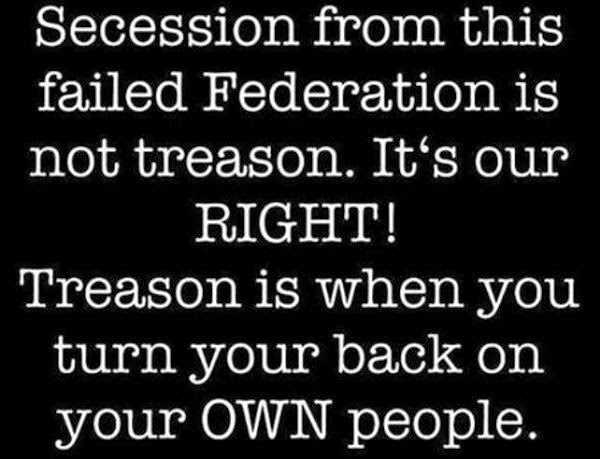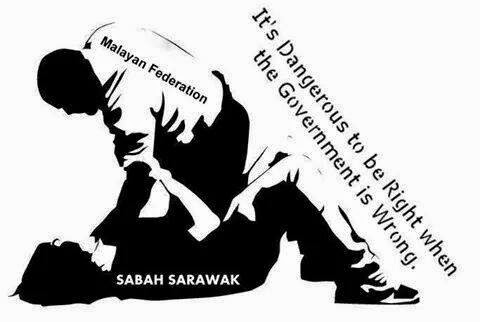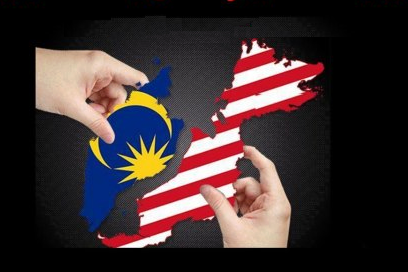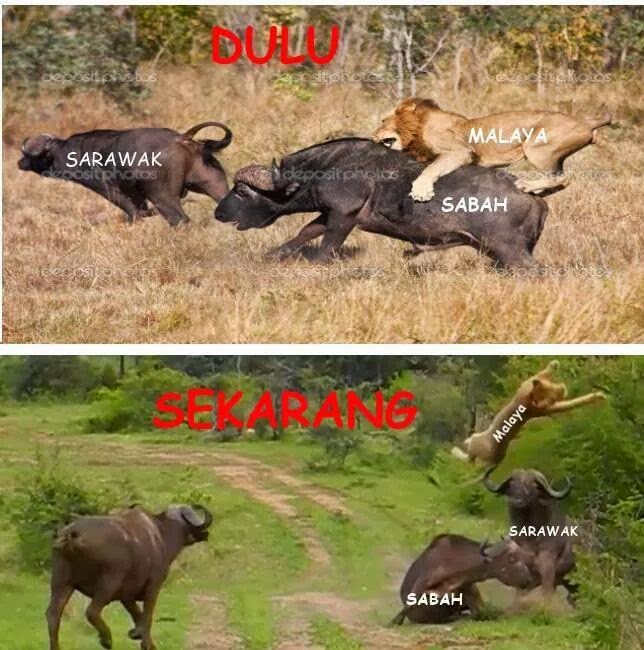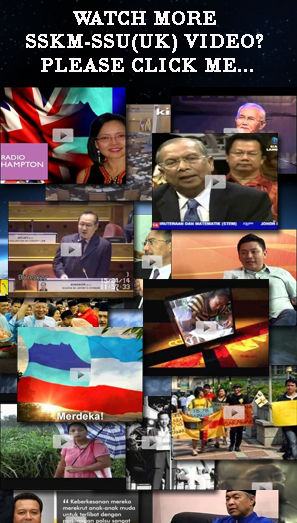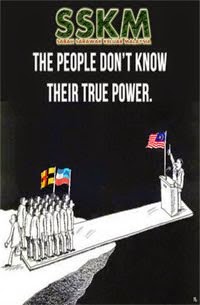Thursday 4 September 2014
Thursday, September 04, 2014
Agreement of Malaysia
,
Exposing the Truth
,
History
,
malaya
,
News
,
Rights
,
Sabah
,
Sarawak
,
Secession
,
Separation
No comments
Mr PM, guns and jail aren’t the answer
Zaid Ibrahim
Instead of using the Sedition Act to get even, our leaders should engage with the people on their grievances.
The Prime Minister must quickly call for a national dialogue so we can talk about what qualifies as “sensitive” and “insulting” and what does not. The PM must start talking with those whom the police has described as “secessionists”.
Getting more people arrested for sedition is never a clever way to deal with problems. We must first know what the problem is, and what the sedition law seeks to realistically protect. Leaders must expect that in the Internet age, we are bound to have more people expressing their opinions on a public platform.
But society will not crumble just because some idiots express their idiotic opinions on social media.
There are many others who do provide good feedback; if only the government cares to listen. Why do we pay so much attention to such individual insults that the government needs to act so drastically?
Shouldn’t the PM and his Home Minister pay less attention to these inconveniences, which public officials must bear if they want to hold public office? Anyway, let’s have a national dialogue with leaders from different communities to reduce the so-called seditious stuff. Our leaders are better off concentrating on the real task of governing the country.
The government gains nothing by restricting opinions that are not favourable to them. Nobody is going to be scared of giving their opinion these days. The Sedition Act may frighten schoolboys or senior government officers, but for most of us our right to freedom of expression is worth fighting for.
For the Sabahans and those in Sarawak, it will take more than being arrested to silence them. How many people does the government hope to jail and how many do they expect to be silenced with this dragnet of charges? It’s just not going to work.
It would be better if our leaders started talking to the people. It’s pointless for Home Minister Dato’ Seri Zahid Hamidi to say non-Malays are being too arrogant now, because arrogance is not against the law. And there are many Malay leaders who are arrogant too! The PM must know the grievances of the people in the East are boiling over.
What our leaders need is a mindset change. They need to engage with those who are critical of them instead of always lashing out at them. They must be more willing to allow the stuff on the Internet without feeling upset about it. Leaders in other countries suffer from the same problem and they do not always react like we do in Malaysia.
Our leaders must stop believing that if they are insulted, the whole country will crack. That’s a sign of arrogance too.
The PM must act now instead of being very quiet (again). Call for peace talks between different factions. Let us talk about what constitutes hate speech, and discuss the possibility of allowing for opinions that qualify as criticism. Have a national dialogue on issues pertaining to the Malaysia Agreement. Let’s not just stereotype arrogant and insulting groups, because it will not solve anything.
The PM must know that peace and stability cannot be imposed by force, guns and jail terms. That has never worked anywhere. Talking and engaging always works to reduce tension and bring back harmony to the country.
Thursday, September 04, 2014
Agreement of Malaysia
,
Exposing the Truth
,
Fact
,
Federation of Malaysia 16 September 1963
,
History
,
Lee Kuan Yew
,
malaya
,
North Borneo
,
Sabah
,
Sarawak
,
Singapore
No comments
INCORRECT ANALYSIS OF SINGAPORE SEPARATION
Please read first this article before you continue to read the article below by just clicking this title story Percubaan Sabah untuk Keluar dari Malaysia dulu BUKAN KHABAR ANGIN... TAPI ITU ADALAH BENAR!!!
What this book is talking about is really the UMNO machinations in tightening colonial control of Sabah through puppets like Harris Salleh- after they used up Donald Stephens and Mustapha.
However some of the analysis were over simplistic such as:
"In mid-July, there were racial clashes between the Chinese and Malays in Singapore which led to the Tunku to decide that Singapore should be booted out. On 9 August 1965,"
"Racial clashes" was not the real reason for separation of Singapore from UMNO's colonising clutches.
The UMNOcrats led by Razak (more than the lame duck PM Tunku Abdul Rahman) feared that the Singaporeans under Lee Kuan Yew would be a serious challenge to their power and hold on Malaya and also Sabah and Sarawak. They feared that LKY could unite all the anti-UMNO forces and capture state power. They simply “kicked out “ Singapore without consulting Sabah and Sarawak as they feared these colonies would follow suit. They were that sneaky. It was our equivalence of “Pearl Harbour”. However, by doing this they actually tore apart the concept of “Malaysia” which was to comprise 4 countries and not 3. This was not the Malaysia deal!
LKY was smart enough to agree to take back Singapore because if he did not it would have became another impoverished basket case country like Sabah and Sarawak and most important totally lose any say in their own destiny..and flooded with "illegals".
"Racial clashes" like May 13 Massacre in Kuala Lumpur used to justify Emergency Rule, was the justification for severing the links with S'pore.
After all the S'pore Malays did not flee in their thousands to Malaya and the causeway is a short run and if they had to they could have swum across....
We need to move our brains and ask did the S'pore Malays wanted to "riot" or was it the hidden hands of UMNO as in May 13 in massacring 30000 Malayan people as claimed by some.. Did Malayan Malays go and start clashes in Singapore as they did in Kuala Lumpur?
In the case of Sabah in 1985 there were bombings and other incidents but UMNO instead of wanting Sabah to separate used these as reason to tighten its control of Sabah!
UMNO's logic can swing 365 degrees but still support its action.
The best example is how the UMNO government signed the 20 Points Agreement with the Sabah (newly independent) Government and reneged by stages breaking all the promises and by stealth and by intimidation began to Islamise Sabah.
Prior to 1963 Sabah was a harmonious society tolerant of all religions and races. Unfortunately UMNO took advantage of and abused this tolerance by deliberately engineering the mass transmigration of Indonesian and Filipino Muslim to dominate Sabah people.
If we agree with the objectives of SSKM, we must unite with all like minded people here and in Sarawak to work to free Sabah and Sarawak from Malayan UMNO colonial rule!
Thursday, September 04, 2014
Darell Leiking
,
Exposing the Truth
,
Fact
,
News
,
North Borneo
,
Sabah
No comments
Anger over Barisan’s incompetence fuelling secession talk, say PKR MP
As police probed a Facebook group discussing secession of Sabah and Sarawak from Malaysia, a Sabah opposition MP has said such talk is arising now due to East Malaysians' anger over Barisan Nasional's incompetence in governance, which has resulted in numerous problems plaguing the two states.
PKR Penampang MP Darell Leiking said the incompetence and failure of the BN-led state governments to voice the people's unhappiness towards Putrajaya has created a divide between Sabah and Peninsular Malaysia.
"If the BN Government had done its job for the past 20 years, Sabahans would be very satisfied with Sabah's position within the Federation of Malaysia and there would be no complaints at all from the Sabahans.
"Even the opposition would not be able to wrestle several seats from BN as evidenced in the previous general election," he said in a statement today.
While he does not believe in secession from Malaysia, the first-term MP cited a litany of problems which he said contributed to the people's dissatisfaction with BN.
This included the large number of illegal immigrants in Sabah, the mistreatment of the Borneon state and the review of oil royalty to be paid to Sabah.
The large number of illegal immigrants saw Putrajaya setting up a Royal Commission of Inquiry in September 2012 to probe problems related to it, including the issuance of Malaysian documents to Muslim illegal immigrants under a scheme known as Project IC.
The Commission had called 211 witnesses in the proceedings and had submitted its findings to the Yang di-Pertuan Agong although the report has yet to be made public despite calls from the opposition and activists.
"Even the RCI report on the existence of the illegal immigrants in Sabah is not forthcoming when Sabahans are eagerly waiting for it despite the fact that Sabahans are the ones who paid the costs for the hearing through the peoples' funds known as taxpayers’ money.
"This caused much resentment and the anger among Sabahans towards the nonchalant attitude of the BN government over all these issues has somewhat come to a point that ordinary and non-partisan Sabahans decided to take things in their own hands by educating and spreading the awareness relating to Sabah such as the Birth of Malaysia, the 20 Points Agreement and Sabah's special rights and privileges which were imbued in the Malaysia Agreement 1963," said Darell.
Darell said what Sabahans wanted is simply to be recognised as an equal partner where their opinions and requests are taken seriously.
As such, politicians, activists, civil society and academicians have shared their thought in some forums, which had been deemed "seditious" by the authorities.
"Why is it seditious in nature to speak and discuss about the special rights and privileges held by Sabah which have been acknowledged by the signatories to the Malaysia Agreement 1963 in the first place or even the mistreatment felt by the Sabahans all these while?" he asked.
Sabah police commissioner Deputy Comm Datuk Jalaluddin Abdul Rahman had said yesterday that the police is investigating the owners of the Facebook account "Sabah Sarawak Keluar Malaysia (SSKM)" and other related websites.
The account aimed to collect 300,000 signatures to support its objective to reinstate the 1963 Malaysia Agreement, a treaty that brought Sarawak, Sabah, and for a short while Singapore, to form the Federation of Malaysia as equal partners but critics have charged that it has now turned to a “takeover project” by Putrajaya.
Calls for Sabah and Sarawak to secede from Malaysia are treasonous, which carry severe penalties under the law.
However, Darell claimed even some BN members supported calls for a more autonomous Sabah but due to pressure, their hands are tied. – September 4, 2014.
Thursday, September 04, 2014
Exposing the Truth
,
Fact
,
North Borneo
,
Sabah
,
Sarawak
,
Separation
,
SSKM
No comments
SMS lodges report against makers of damaging video
NGO Solidariti Masyarakat Sabah lodges police report against another NGO for damaging secession YouTube video.
 KOTA KINABALU: Solidariti Masyarakat Sabah (SMS), an NGO which concedes that 56 per cent of the people in Sabah want to exit Malaysia, has lodged a police report against UK-based Sabah Sarawak Keluar Malaysia (SSKM), an NGO whose objectives are self-explanatory.
KOTA KINABALU: Solidariti Masyarakat Sabah (SMS), an NGO which concedes that 56 per cent of the people in Sabah want to exit Malaysia, has lodged a police report against UK-based Sabah Sarawak Keluar Malaysia (SSKM), an NGO whose objectives are self-explanatory.
“If the UN has a Referendum in Sabah, 56 per cent of the people especially the young will vote for it (getting out),” claimed SMS pro-tem President Musli Oli.
“But they do not know what will happen after that.”
Musli, who did not say how he arrived at the figure, was commenting on the police report he lodged on Tuesday against SSKM.
Musli qualified his comments against SSKM, led by Sabahan Doris Jones, by saying that he was in favour of full autonomy for Sabah as proposed by the Sabah Progressive Party (SAPP) President Yong Teck Lee.
“We fight for Sabah rights within the framework of Malaysia,” said Musli. “We fight for the Malaysia Agreement 1963, higher oil royalty and for Sabah to be recognised as a Nation but within the Federation.”
Explaining the differences between SSKM and SMS which prompted the police report, he claimed that the former was trying to instil hatred towards Sabah and national leaders.
“There’s a SSKM video on YouTube talking about bringing Sabah and Sarawak out of Malaysia,” said Musli. “It has been shared 10,000 times. They must be investigated and stopped in their campaign and the ways they use to garner support.”
SSKM, warned Musli, is active in social media like Facebook, Twitter, newsletters and blogs besides being on YouTube and holding ceramah and seminars especially in the interior of Sabah.
SMS, stressed Musli, is particularly upset that the United Borneo Front (UBF), an NGO led by Bingkor Assemblyman Jeffrey Kitingan, is working with SSKM to collect 300,000 signatures in Borneo for a 2nd People’s Petition on self-determination to be submitted to the United Nations.
The 1st People’s Petition in 1962 was allegedly derailed by the British through the Brunei rebellion.
SSKM was not present in Miri recently when the 2nd People’s Petition was signed by Jeffrey and the Sarawak Association for People’s Aspirations (SAPA) President Lina Soo and other NGOs.
Thursday, September 04, 2014
Exposing the Truth
,
Fact
,
History
,
North Borneo
,
Sabah
,
Tun Mustapha
No comments
Tun Mustapha: The People Love Me
May 31, 1985
AsiaWeek – Interview with Tun Mustapha Harun
 For
Malaysian old enough to remember, the name Tun Mustapha Harun stirs
vivid memories of the late 1960s and early 1970s when the lean, chain
smoking, charismatic figure ruled the East Malaysian state of Sabah with
an iron hand. “Maybe I am the most criticized, most maligned man in
this part of the world,” he says with a chuckle. “(But) I tell you the
people here still love me.” The stuff of legends at 67 still draws a
crowd when he speaks and sees himself as “still young.” Says he: “I have
ten children. And maybe a few more to come.” Born in a section of Sulu
royal family that fled to Borneo about a century ago, Mustapha in 1934
joined the British North Borneo Company that owned Sabah, beginning as
an office boy in the district office in Kudat. When Sabah became a
British Colony after the war, Mustapha was already the paramount chief
of the Muslims in the Kudat area. In 1955 he was appointed to the
colony’s legislative and executive councils making his entry into
politics. Last week Mustapha granted a rare interview. In the Kota
Kinabalu office of the Muslim Welfare Organisation that he heads, lie
talked to Asiaweek’s Assif Shameen for two hours about the past and
present. Excerpts:
For
Malaysian old enough to remember, the name Tun Mustapha Harun stirs
vivid memories of the late 1960s and early 1970s when the lean, chain
smoking, charismatic figure ruled the East Malaysian state of Sabah with
an iron hand. “Maybe I am the most criticized, most maligned man in
this part of the world,” he says with a chuckle. “(But) I tell you the
people here still love me.” The stuff of legends at 67 still draws a
crowd when he speaks and sees himself as “still young.” Says he: “I have
ten children. And maybe a few more to come.” Born in a section of Sulu
royal family that fled to Borneo about a century ago, Mustapha in 1934
joined the British North Borneo Company that owned Sabah, beginning as
an office boy in the district office in Kudat. When Sabah became a
British Colony after the war, Mustapha was already the paramount chief
of the Muslims in the Kudat area. In 1955 he was appointed to the
colony’s legislative and executive councils making his entry into
politics. Last week Mustapha granted a rare interview. In the Kota
Kinabalu office of the Muslim Welfare Organisation that he heads, lie
talked to Asiaweek’s Assif Shameen for two hours about the past and
present. Excerpts:
In
1963 Mustapha was appointed Governor of Sabah when the British colony
joined the Federation of Malaysia. Only a year before, Mustapha had
formed the United Sabah National Organisation but the role of Chief
Minister went to Donald Stephens, a charismatic Kadazan leader. Mustapha
and Stephens soon became sworn enemies and Mustapha was accused of
interfering in state politics when his role was merely constitutional
head.
“I
was Governor for 18 months. It was really terrible. I felt like a big
bird in a small cage. I couldn’t do anything. Stephens would never
listen to me. He thought as he was Chief Minister he had a licence to do
anything. I told him as Governor I too had some powers. We clashed a
few times but it all came out in the open towards the end of 1964 when
he presented me with a text of the policy speech that I was to deliver
at the assembly. The clash was about how the administration should work.
The text of speech was very inadequate and I told him to go away and
make amends. He told me that Governors was only supposed to read the
speeches prepared by the Chief Minister. I told him the Governor had
every right to make changes. So the next day I stood up at the Assembly
and read out a different speech. I had added new paragraphs and
discarded some of Stephens’ text. He was horrified and complained to
Tunku Abdul Rahman. In my speech I stressed multiracialism and improving
the standard of life and educating the rural people. When Tunku heard
my side of the story he said Mustapha is right. Rural development is
important and we must have balance because there are so many races in
Sabah”.
In
early 1965 Mustapha resigned as Governor saying he couldn’t work with
Stephens. Soon after his resignation was accepted the Tunku asked
Stephens to join the federal government as minister for Sabah Affair. In
August 1965 Singapore was ousted from the Malaysian Federation and
Stephens, a close friend of Lee Kwan Yew, resigned his ministerial post.
Mustapha was invited to replace him.
“I
join the Federal Government on the persuasion of Tunku. He tried for
three days and at the end of every day I used to tell him ‘I don’t want
to be a minister in the Federal Government.’ I don’t know why I took it
but I realized that there were going to be elections in Sabah soon and
my eyes were on the State Government. I reorganized USNO and the same
time Stephens was busy reorganizing his party, UPKO [United
Pasok-Momogun Kadazan Organisation]. In the 1967 elections, UPKO won 12
seats, USNO 14 and the balance was with Sabah Chinese Association which
had 5 seats. There was one Chinese independent. I got the SCA to join
hands with USNO so I became Chief Minister in 1967. In the late 60s
there were no major political problems in Sabah. Stephens left politics,
dissolved UPKO and merged it with USNO. Our relations with the Federal
Government were very good. Tunku was the closest friend I had”.
But
soon after Tunku stepped down as Prime Minister, Mustapha began to have
problem with the Federal Government which thought he was increasingly
charting an independent course for Sabah. His battles with Premier Tun
Abdul Razak and Deputy Premier Tun Dr Ismail are legendary.
“I
had nothing personal against Tun Razak or Dr Ismail. It was always on
policy matters. One big clash I had with Razak was over foreign policy.
He thought as Sabah Chief Minister I had no right to interfere in
foreign affairs. I was saying this is federation. Everyone has say in
the running of foreign affairs. In 1973 he began to make statements that
he wanted to normalize relations with China. I am an anti-communist.
But
I have nothing against the Russian people or the Chinese people. I just
don’t like their system, that’s all. All my life has been spent in a
free system. So when Tun Razak started talking about normalizing
relations with China I flew to Kuala Lumpur, I said to him ‘Tun, are you
crazy? How can we have good ties with the bloody communist?’ At that
time even the U.S didn’t recognize China. I asked Razak why Malaysia
should have relations with China. He said to me there were four
objectives he wanted to accomplish on his China trip. One, he wanted
China to persuade the communist guerilla in the jungle and the border to
scale down or stop the war against Malaysian forces. Two, he wanted
China to support the region to be neutralized. Three, he was planning
elections in 1974 and didn’t want a repetition of 1969 when the Chinese
voters deserted the alliance and voted for the opposition. Four, he
wanted Chinese support for the Straits of Malacca to become territorial
water.
I
told him he’d be lucky if Mao or Chau En-lai would agree to even
consider one concession he wanted from them. I told him I know the
mentality of communist leaders. In the end I was proven right. As far as
the Chinese voters are concerned, I told him there is nothing to worry
about as long as they are in a minority. If Chinese are smaller in
number there is nothing they can do politically. But Razak would not
listen. He kept saying ‘Mustapha, you don’t understand foreign policy.’ I
told him ‘Yes, I do understand. It is you, Tun, who don’t appreciate my
point.’ So we clashed and quarreled.
The
clashes between the two men led to a point of no return and Razak
wanted Mustapha removed from his position. He offered Mustapha
appointment in Kuala Lumpur as Defence Minister but Mustapha turned it
down. In mid-1974 Razak began wooing Mustapha again.
“I
knew all along he wanted me out of Sabah. He told me that he was
offering me the Defence Minister because he wanted to consolidate power
in Kuala Lumpur. I was like a brother to him. Despite our differences on
policy we are good friend. Financial, material, moral, whatever support
he needed, I gave him. He used to call me ‘Mustapha, I want this.’ I
would say ‘Right, OK’.
When
Razak insisted that I join the Federal as Defence Minister I said, I
will on one condition: I have a free hand in running the ministry and
strengthening the county’s defence by beefing up our arsenal with new
sophisticated equipment. I took leave as chief minister and appointed my
deputy as acting CM and went to Kuala Lumpur to prepare a working paper
with the help of Gen. Mahmood Suleiman and a few others. Day and night
the committee sat discussing what equipment should be bought from where.
When Razak saw the working paper he said ‘Wow, this is very good. Now
our defence will be very strong. But later he turned around and said,
‘This thing going to cost us a fortune, Mustapha. Where are we going to
get all the money?’ I told him, ‘You just say you agree with the
proposal. I will get the money.’ So I went to Ghaddafi in Libya and King
Faisal of Saudi Arabia. It was 1975, Vietnam and Cambodia were falling
to communist. Thailand and Malaysia were next. Gaddafi said, ‘Ye, we
must have a strong Muslim nation in Southeast Asia.’ King Faisal was
also very receptive to my idea. He said to me, ‘Go, buy the arms. Don’t
worry about the repayment. If Malaysia has a fortune one day it can pay
back Saudi Arabia. If not, never mind, I’ll share my money for the
defence of my Muslim brother.’ You know I had 10 billion [Malaysian
money] in pledges from Ghaddafi and King Faisal and some others. King
Faisal said to me he would never allow a Muslim country like Malaysia to
fall to communist”
Once
he had the pledges, Mustapha, officially still Sabah’s chief minister,
flew around the globe wrapping arms deals, much to the chagrin of
Premier Razak and others in federal government who suspected that
Mustapha’s main objective was to collect commissions.
“I
approached the Malaysian ambassador in Paris to ask the France defence
minister whether he could have 25 Mirage fighters. I went to Washington
to look for a big aircraft carrier. I told the British defence secretary
that we were interested in 25 Phantom jet fighters. We were also in
touch with the German to purchase a destroyer and some submarines. I was
doing all these because I didn’t want to take over as defence minister
of a weak nation. Once we had all this equipment, I told Razak, I will
resign from Sabah and become defence minister. But before the plan could
be finally approved Razak called me and said that he had been thinking
about the whole thing. I said to him, ‘What is there to think about?,
Ghaddafi is willing, Faisal says money no problem. If we have the money,
why don’t we buy?’ But Razak said to me, ‘You don’t understand foreign
policy. If we strengthen our defences our neighbor will be suspicious.
China and Russia will be angry. There might be a war.’ I said, ‘Rubbish.
The communist guerillas have been fighting a war with us for 30 years.’
I told him, when we have the arms we would have nobody to fear except
god. But Razak said no. So I turned down the request to become defence
minister. I wasn’t doing anything for money. It was Razak’s idea to make
me defence. I tell you I have enough money without doing hanky-panky.”
Mustapha
bitterest dispute with Razak and other federal leaders was over the
formation of Barisan Nasional, an expanded coalition that would include
winning parties from all states besides all the Alliance members UMNO,
MCA and MIC. Mustapha thought it was another plan to clip his wings and
federal leaders saw his reluctance as further proof that he wasn’t
interested in national integration and harmony.
“The
Barisan Nasional was a modified plan. The original idea of Tun Razak
and Dr Ismail was to have one party system Razak told me one day. I
think it was 1973, that after what happened in the 1969 general
elections and the subsequent riots, he had concluded that a multi-party
system was not for Malaysia. I said to him, ‘Tun, we have a democratic
system. We can’t had our system with this one-party plan.’ Then he told
me the plan was to merge UMNO, MCA, MIC and the rest. He said, ‘USNO
will also have to merge.’ I told him there was no way USNO will merge
with anybody. In a multiracial society every community must have its
say. In a federation every State must have its say. He kept saying we
had the system in 1969 and look what happened. Later he modified his
plan and appointed Ghafar Baba to draft a constitution for Barisan. I
think it was during this time he made up his mind that I should be
removed from Sabah. He was only waiting for a right time to topple me.
In 1975 BERJAYA was formed on the orders of Tun Razak. He encouraged
Harris, Stephens and the others. I was also opposed to the initial draft
of the Barisan constitution. All power was with Kuala Lumpur. It was
like dictatorship. I told Tun Razak, ‘You can’t direct everything like
the colonial office in London used to. We already have our Merdeka.’ But
he amended the constitution. They call me dictator but I tell you I did
more for democracy in Malaysia then any of the other leaders.”
As
he battled on against what he describes as federal interference.
Mustapha reopen issue after issue, much to the annoyance of Kuala
Lumpur. A key one was oil royalties.
“I
told Razak that Tunku had agreed that according to the 1963 agreement
all natural resources would be shared between federal government and
state government. In 1974 when oil prices began to move up I went to
Razak and said before we talk about other things let us talk about oil.
Offshore oil we share 50:50 with federal. Onshore we get 60, federal
takes 40 percent. Razak said no. So I negotiated. After talks which went
on for months, Razak agreed on 80:20 for both onshore and offshore, 20
percent for us, 80 percent for them. But before it could be finalized
they toppled USNO and one of the first things they did was to get
Berjaya to agree on a deal that gave them 95 percent of all oil
royalties. If Sabah could maintain 20 percent of the oil royalties it
would be a very rich state. But BERJAYA sold out on everything. They
were puppets.”
Federal
leaders and his successors in the State Government called Mustapha’s
administration autocratic and dictatorial. Books on Sabah’s contemporary
history describe his government as being plagued corruption and
economic mismanagement.
“Those
who accuse me of being autocratic and dictatorial are the ones
committed misdeeds themselves. I was only a scapegoat. I don’t care what
people say or write about me. It doesn’t matter. I got 16 seats and
came very close to getting another five. After what they wrote and said
about me you would think I couldn’t win a seat.
But
people are not fools. I ruled by consensus but Harris ruled by brute
force. He was a minister in my cabinet but resigned to start his own
business and bought a 10,000 acres rubber plantation. He chopped all the
trees down, planted it with tapioca. I said to him, ‘Harris, you’re
mad. Why cut these trees? But he said tapioca will make more money than
rubber.
He
said he could sell to Taiwan, Thailand, Hong Kong. He invited me to
inaugurate his factory. After a few months he was bankrupt so he came
crying to me. ‘Tun, please help me.’ So I gave him some timber land to
cover his outstanding loans with the bank. I got the state land
development authority to take over his plantation. He was over extended.
I had to keep helping and he kept coming back. Ungrateful.
Harris
says that I was a dictator. You can refer to minutes of cabinet
meetings of USNO supreme council. It should be all there unless they
have burnt them. There were discussions and then consensus. In the party
there was democracy. I welcome suggestions.
But
sometimes in the party and the cabinet they said ‘No, Tun, you decide.
We leave it to you.’ They wanted me to get the impression that they were
very loyal to me. I didn’t know it then but I now realize what they
were doing. They all wanted to make me happy so that I will give them
timber land or some contract. But this is not dictatorship. Under Harris
there was no democracy. He forced his decision on people. Before
anybody could speak he used to say ‘I have decided that…’ In the party
everything was engineered. He used to tell people, you stand for this
post, you stand for that, you nominate this man, I’ll get you nominated
by that man. If I was a dictator and autocrat you have to find another
word for Harris, much worse.
I
admit many of my ministers were corrupted. Many close friends were also
corrupt. They used my name to do all sorts of hanky-panky. They knew
because I am a nice man and I don’t betray my friends, I won’t touch
them. That’s how Sabah got this bad reputation of corruption. Most of
this hanky-panky went on while I was away. I have family outside. I have
so many business interests in London, in Australia, so I have to be
away. Most of the ministers and my friends who applied for timber lands
got them while I was away. My deputy gave them all. But I have to save
his face and the face of others so I can’t do anything. Now they say
Mustapha is a bad man. He is corrupt. My mistake was I just closed my
eyes when all this was going on. Now my eyes are wide open. Under Harris
there was more corruption. It is now all coming out.”
In
1975, Mustapha angry at Kuala Lumpur’s interference and its campaign to
trim his powers, threaten to pull Sabah out of Malaysia. At one point
he even contemplated joining forces with the Sulu region in the Southern
Philippines and Sarawak. Some aides say he toyed with the idea of
becoming sultan of an expanded Sulu-Borneo state.
“I
never wanted to pull Sabah out of Malaysia. It was all lies perpetuated
by the federal government and their agents here. I even appointed a
committee to review the question of Sabah’s autonomy under the Malaysia
Federation. The committee prepared a report on the things that we were
to surrender to the federal government as the 10-year transitionary
period under the 1963 agreement was over. I did say once or twice that
we should leave Malaysia. It was more of a slip of tongue. Razak kept
testing my patience. He provoked me and in anger I said, ‘look, if this
sort of thing goes on we will take Sabah out of Malaysia.’ I remember
saying if Singapore can be independent we can go too. But it was a slip
of tongue under provocation. I was frustrated at the time. But the
federal government capitalized on it and played it up. They made me look
like a monster. But people know I am not anti-Malaysia. I have done
many for Malaysia than many of the people who criticize me. One thing I
will not stand is the colonizing of Sabah, whether it is by the federal
government or any other country. Nobody can be allowed to colonise
Sabah.
I
never wanted to merge Sabah with Sarawak or Sulu and Brunei and become
sultan. This is the sort of rubbish that has been printed before. It is
ridiculous. “Why should I want to become king or sultan? All the power
was with the Chief Minister.”
During
Mustapha’s rule the issue of the Philippines’ claim to Sabah came to
the boil. Amid growing rebellion in the southern Philippines, Mustapha
helped form the Moro National Liberation Front. With Mustapha’s help the
Muslim rebellion found Arab support.
“As
far as I am concerned there is really no claim. It was settled in 1939
by the British chartered company. There is a high court judgement to
prove that. I personally stand to benefit if the claim was valid as I am
one of the heirs of the Sulu sultan. But I know there is no claim. The
federal government I think has a clever policy on the so called claim.
They don’t ignore it altogether but they don’t entertain it either.
Maybe they want to use it against the Sabah people as a bargaining item
to make them behave. If Sabah people do anything they can say ‘Look, we
will leave you to the Philippines.’
The
story of MNLF is very straightforward. If you and I have a common
enemy, will we do anything to help him? No, we will create problems for
him. That was how MNLF came [about]. I was not the only one involved.
Ghaddafi was involved, Kuala Lumpur was involved, other Muslim countries
were involved, and so many people were involved. My role is 10 percent
or 20 percent. You look at it this way: the Philippine armed forces were
bombing the Sulu people so they came here for shelter. I helped refugee
mainly because of human consideration, not political. Later it became a
political matter. Even if I was one who created this MNLF it doesn’t
mean I was involved in the war. Libya was giving arms. Others were
giving money. I was only giving refuge to refugees. I never gave arms to
anyone. Not to MNLF, not to anybody. You say arms went through Sabah.
Well, I tell you I didn’t give permission to send them from here. Sabah
is big state. I can’t be expected to check everybody.”
Early
on April 22, Mustapha was sworn in as Sabah Chief Minister after
Pairin’s PBS won a majority in the Assembly. Mustapha says Pairin should
have been called first to form the government, but says that it’s the
governor’s prerogative to call anyone. Mustapha says he was lucky that
he was called since he didn’t have a majority. No, he intends to get
back the Chief Minister’s seat which he says is rightfully his.
“At
2 a.m. Majid Khan a close friend to Harris came to see me with USNO
leader Yahya Lampong and my son Abdul Hamid. They said [Deputy PM] Musa
had given the blessing and green light for an USNO-BERJAYA coalition. I
have no access to Musa. Even if I had how dare I have someone up at that
time to check. I asked Majid Khan, ‘How are we going to form the
government? It is USNO 16, Berjaya 6, PBS 26.’ By 2 a.m. I knew the
whole result. Majid Khan said there are six nominated seats. I told him
we must accept the will of the people. But he kept saying ‘Musa want you
to take oath, the governor is waiting. Let’s go now.’ I went to the
istana at 2.30 a.m. At about 3.30 a.m. I took the oath. Harris only
called Musa at 3.40 a.m. We told the governor that we will be back at 7
a.m. with a list of nominated members and cabinet line-up. Cabinet was
supposed to take oath at 7.30 a.m. When we came back to my house Majid
Khan insisted he wanted to be appointed one of the six nominated
members. BERJAYA would nominate 3, USNO 3. He said in cabinet it would
be 4 for BERJAYA, 4 for USNO. I said ‘You are a fool. You win six seats;
you want 4 ministers in the cabinet.’ No more discussion. Later in the
morning I called Kuala Lumpur and I was told that Musa had already told
Harris ‘no coalition with USNO.’ If not for Berjaya’s greed six members
would have been nominated and cabinet sworn in at 7.30 a.m. No way could
Pairin be sworn in. I tell you I am still the chief minister because
the letter revoking my appointment is unconstitutional.”
Thursday, September 04, 2014
Exposing the Truth
,
Fact
,
News
,
North Borneo
,
Sabah
,
SAPP
,
Separation
,
Yong Teck Lee
No comments
Separation not secession
Yong Teck Lee says Sabahans are not secessionists or traitors. They only want separation from Malaysia.
 KOTA KINABALU: Former Sabah Chief Minister Yong Teck Lee has said it is not right to label any movement in Sabah as “secessionist” because the state was historically not part of Malaya/Malaysia.
KOTA KINABALU: Former Sabah Chief Minister Yong Teck Lee has said it is not right to label any movement in Sabah as “secessionist” because the state was historically not part of Malaya/Malaysia.
He thinks the term “separation” is more appropriate.
For example, Singapore separated, not seceded from Malaysia in 1965, he pointed out.
“We also reject any talk that Sabahans are traitors,” said Yong, who heads the Sabah Progressive Party (SAPP).
“Sabahans are patriots who want to see a successful Malaysia that respects, recognises and upholds the letter, spirit and intent of the Malaysia Agreement 1963, without which there would be no Malaysia.”
The real traitors in the country, said Yong, are those who gave out MyKads to illegal immigrants, “fake” sultans who claim that Sabah belongs to them and extremists who divide Malaysia dangerously along racial and religious lines.
“It’s indicative of the sad state of the Malaysian Federation today when top federal leaders chose the Merdeka week to issue threats against Sabahans for being so-called secessionists,” he said.
He said that after 51 years of federation with the peninsula, Sabahans were no longer cowed by such threats.
To threaten Sabahans with arrests would only harden their resolve as they already see no solution within the Malaysia context, he added.
“There’s no apparent effort by the Federal Government to resolve the issues that drive Sabahans to cry for separation from the peninsula,” said Yong. “There’s a need to understand this cry for separation and solve the grievances of Sabahans.”
Thursday, September 04, 2014
Agreement of Malaysia
,
Exposing the Truth
,
Fact
,
malaya
,
North Borneo
,
Sabah
,
Sarawak
No comments
Putrajaya to meet ‘separatists’
***WE WANT TO CLEAR THE AIR ABOUT THE TITLE "SEPARATISTS" GIVEN TOWARDS US. WE ARE NOT SEPARATISTS! WE ARE PROUDLY CALL OURSELVES AS BORNEO NATIONALISTS FROM SABAH AND SARAWAK!***
Wan Junaidi says they won't be arrested as long as they don't break the law.
KUCHING: Deputy Home Minister Wan Junaidi Tuanku Jaafar wants to try and meet with the “separatists” advocating independence of Sabah and Sarawak from Malaysia, and listen to them, instead of arresting them for their activities.
“As long as they don’t break the law, we are not going to arrest them,” he said in a statement here yesterday warning the activists against overstepping the boundaries in exercising their freedom of speech. “The government is even willing to bend over backwards to give them time and space to come around.”
“We know who they are and even their names. We are monitoring and watching them. We are monitoring to see how serious the whole thing develops.”
In Sarawak, he said, the individuals concerned were residing all over the state. The movement, according to him, involved only a few persons, “mostly disgruntled politicians who not many right-thinking Sarawakians would believe”.
In Sabah, he said the situation was under control as it merely involved “disgruntled politicians” who had been using the social media as their platform to express their views and influence others.
Among disgruntled Sabah politicians advocating the independence of the two Borneo nations, he stressed, was United Borneo Front (UBF) president Jeffrey Kitingan, “who had been having problems working with other politicians”.
“Jeffrey wants to be the boss and have the last say. So he is trying to influence others,” said Wan Junaidi. “But how many people with logical minds will be influenced by him?”
Nevertheless, said the Deputy Home Minister who is also the Santubong MP, says he understands the sentiments and rationale of these “separatists” and would try “to see not just the negative side of it but also the positive side”.
“Look at the basic needs in rural areas of Sarawak and Sabah – the roads, the schools, electricity and water supplies,” he added. “The rural people are still lacking these basic facilities and amenities. It is natural that Sarawakians and Sabahans are not happy.”
He pledged that he would try his best as an MP to address the issue of the backwardness of the rural areas in the Borneo nations and bring it to the attention of the federal government.
Thursday, September 04, 2014
Exposing the Truth
,
Fact
,
Federation of Malaysia 16 September 1963
,
History
,
North Borneo
,
Sabah
,
Sarawak
No comments
Sejarah adalah Sarjana Agung Dunia
1. Selayang pandang tentang pembentukan Malaysia, yang dicetuskan oleh Tunku Abdul Rahman Putra pada 27 Mei 1961 dalam satu majlis yang disediakan oleh Persatuan Wartawan Luar Asia Tenggara di Singapura, yang mana telah menjadi kenyataan, tatkala pemimpin utama negara-negara yang terlibat bersetuju untuk menandatangani perjanjian ‘Perjanjian Malaysia 1963’ yang mendasari pembentukan Malaysia pada 9 Julai 1963.
2. Sedia maklum bahawa negara Malaysia menggabungkan empat buah negara yang saling terpisah dan berjauhan. Namun, dalam konteks selepas penubuhan Malaysia telah menjadi sebuah negara baru yang dilindungi oleh ‘20 Perkara’ sebagai pagar emas pembentukan Malaysia.
3. Sesungguhnya negara Malaysia, laksana tiga buah rumah di dalam sebuah kampung. Walaupun berjiran dan duduk berdekatan, namun keluarga masing-masing tidak boleh mengambil harta milik jiran sesuka hati tanpa mengambil kira adat dan adab berjiran, apatah lagi menyamun atau merompak harta jiran yang kaya dan mewah pada mulanya, sehingga menjadi yang termiskin seantero dunia pada akhirnya.
4. Malangnya, dalam konteks pengurusan dan pentadbiran ekonomi negara Malaysia, betapa Malaya yang merupakan hanya sebagai salah satu antara tiga buah rumah dalam perkampungan Malaysia, yang ditubuhkan pada 16 September 1963, yang didominasi pimpinannya oleh Melayu UMNO, bukan sahaja sepenuhnya gagal untuk menjadi jiran yang baik, bahkan haprak sepenuhnya, setelah sekian tahun merempuh kuasa autonomi negara Sabah dan Sarawak, di samping memunggah kekayaan wilayah Borneo ke Malaya tanpa mengadabi ‘20 Perkara - Aku Janji’ yang telah disepakati, dipersetujui dan ditandatangani bersama pada 9 Julai 1963 di parlimen British.
5. Pada umumnya, minda warga Malaysia disogok dengan propaganda sejarah yang kononnya (Malaysia Merdeka) pada 31 Ogos 1957. Kalau begitu, apakah nama negara yang dimasyhurkan kemerdekaannya pada 31 Ogos 1957? Kalau begitu, apakah nama negara yang dimasyhurkan penggabungannya pada 16 September 1963?
6. Apapun jawapannya, yang pasti waktu adalah saksi abadi sejarah. Apapun jawapannya, waktu bukan ‘Kambing Hitam-Enam Jahanam’ yang ada tawar menawar dengan wang ringgit untuk meminda atau mengubah tarikh meliwat atau diliwat. Apapun jawapannya, waktu yang agung tidak pernah berbohong atau mungkir janji, kerana waktu adalah perakam yang setia segala peristiwa dan peradaban manusia sepanjang zaman.
7. Sesungguhnya pembentukan Malaysia oleh empat buah negara yang bergabung telah melibatkan beberapa perjanjian. Perjanjian tersebut bertujuan untuk menyerahkan kuasa British (de legist) dalam bentuk pemerintahan sendiri (autonomi) kepada negara-negara yang terlibat sebagai syarat penggabungan menjadi atau membentuk sebuah negara merdeka yang bersekutu.
8. Sedia maklum bahawa, walaupun Malaya telah mengisytiharkan tarikh kemerdekaannya pada 31 Ogos 1957, tetapi tarikh sebenar ditandatangani perjanjian pembentukannya oleh Raja-Raja Melayu dengan Ratu England ialah pada 5 Ogos 1957. Dengan ungkapan lain, tarikh pengisytiharan kemerdekaannya didahului oleh tarikh perjanjian pembentukannya.
9. Singapura pula telah diberi kuasa autonomi oleh British melalui perjanjian perlembagaan (The Constitutional Agreement) yang ditandatangani di London. Oleh yang demikian, pada 3 Jun 1959 Undang-Undang Negara (State Constitution) bagi Singapura telah dimasyhurkan oleh Gabenor Sir William Goode, sekaligus menjadi Ketua Negara Singapura yang pertama. Manakala Lee Kuan Yew dilantik menjadi Perdana Menteri Singapura yang pertama.
10. Dalam konteks pembentukan Malaysia yang ditandatangani oleh semua negara yang terlibat pada 9 Julai 1963. Selepas pembentukan Malaysia ditandatangani atau sebelum tarikh 16 September 1963, negara Sarawak telah memasyhurkan kuasa autonominya atau kuasa pemerintahan sendirinya pada 22 Julai 1963. Kemudian, disusuli oleh Negara North Borneo (Sabah) yang telah memasyhurkan kuasa autonominya atau kuasa pemerintahan sendirinya pada 31 Ogos 1963.
11. Selepas 16 September 1963 atau sesudah pembentukan Malaysia berkuatkuasa, maka seluruh sistem pentadbiran negara-negara yang terlibat hampir berubah sepenunya. Contohnya, sistem ketua pemerintahan bagi Singapura yang sebelumnya disebut atau dipanggil Perdana Menteri telah diturunkan statusnya hanya kepada Ketua Menteri. Demikian juga halnya dalam soal sistem kehakiman, Mahkamah Agung Singapura telah ditukar statusnya hanya kepada Mahkamah Tinggi Singapura.
12. Lantarannya, dalam tempoh dua tahun sejak penggabungan Malaysia, atas sebab-sebab tertentu sama ada yang berhubung dengan krisis politik, krisis kaum sehingga ke krisis peribadi pemimpin tertentu, semuanya telah menjadi pemangkin kepada proses pemisahan Singapura dari gabungan Malaysia yang akhirnya, Perjanjian Kemerdekaan Singapura (The Independence of Singapore Agreement) telah dimasyhurkan pada 9 Ogos 1965 yang dengan bangganya.
13. Singapura akan selamanya merupakan negara demokrasi yang berdaulat dan merdeka yang didirikan berdasarkan prinsip-prinsip kemerdekaan, keadilan dan berusaha mencapai kesejahteraan serta kebahagiaan bagi warganegaranya dalam masyarakat yang lebih adil dan setara.
14. Justeru, Singapura telah sekian lama meninggalkan Sabah dan Sarawak putih mata serta gigit jari untuk menjadi wilayah yang sekalipun kaya dan mewah pada mulanya, namun yang termiskin dalam gagasan Malaysia pada akhirnya, gara-gara merengkok di bawah pimpinan penyangak Melayu UMNO gamaknya.
STATUS SABAH DALAM PERJANJIAN MALAYSIA 1963
Tajuk : Perjanjian berkenaan dengan penubuhan Malaysia
Pengarang :
Kerajaan United Kingdom;
Kerajaan Persekutuan Tanah Melayu;
Kerajaan Borneo Utara;
Kerajaan Sarawak; dan
Kerajaan Singapura.
Editor : Pertubuhan Bangsa-Bangsa Bersatu
Tahun : 1963
Penerbit : Pertubuhan Bangsa-Bangsa Bersatu
Alamat : New York
PERJANJIAN BERKENAAN DENGAN PENUBUHAN MALAYSIA (VERSI MELAYU)
No. 10760 United Kingdom of Great Britain dan Northern Ireland, Persekutuan Tanah Melayu, Borneo Utara, Sarawak dan Singapura
Perjanjian berkenaan dengan penubuhan Malaysia antara United Kingdom of Great Britain dan Northern Ireland, Persekutuan Tanah Melayu, Borneo Utara, Sarawak dan Singapura.
1. Kerajaan United Kingdom of Great Britain dan Northern Ireland;
2. Kerajaan Persekutuan Tanah Melayu;
3. Kerajaan Borneo Utara;
4. Kerajaan Sarawak; dan
5. Kerajaan Singapura.
Perjanjian berkenaan dengan penubuhan Malaysia 1963
United Kingdom of Great Britain dan Northern Ireland, Persekutuan Tanah Melayu, Borneo Utara, Sarawak dan Singapura;
Oleh kerana hendak membuat suatu perjanjian berkenaan dengan Malaysia;
Bersetuju saperti di•bawah ini:
Perkara I
Tanah2 Jajahan Borneo Utara dan Sarawak dan Negeri Singapura hendak-lah di-sekutukan dengan Negeri2 Persekutuan Tanah Melayu yang ada sekarang sa-bagai Negeri Sabah, Negeri Sarawak dan Negeri Singapura mengikut surat2 perlembagaan yang di-kembarkan kapada Perjanjian ini dan Persekutuan itu kemudian daripada itu hendak-lah di-namakan « Malaysia ».
Perkara II
Kerajaan Persekutuan Tanah Melayu akan mengambil Iangkah2 yang sesuai dan yang terbuka kapada-nya menentukan bahawa Parlimen Persekutuan Tanah Melayu akan meluluskan suatu Undang2 mengikut chara yang di-tetapkan dalam Kembaran A kapada Perjanjian ini, dan behawa Undang2 itu di-jalankan kuat kuasa-nya pada 31 haribulan Ogos, 1963 (dan tarikh Undang2 tersebut di-jalankan kuat kuasa-nya itu sa-lepas ini di-gelar « Hari Malaysia »).
Perkara III
Kerajaan United Kingdom akan menyembahkan ka-bawah Duli Yang Maha Mulia Baginda Queen sa-belum Hari Malaysia Perentah2 dalam Majlis Meshuarat bagi maksud menguat kuasakan Undang2 Tuboh Kerajaan Negeri2 Sabah, Sarawak dan Singapura sa-bagai Negeri2 di-dalam Malaysia saperti yang di-tetapkan dalam Kembaran2 B, C dan D kapada Perjanjian ini.
Perkara IV
Kerajaan United Kingdom akan mengambil Iangkah2 yang sesuai dan yang terbuka kapada-nya menentukan bahawa Parlimen United Kingdom akan meluluskan suatu Undang2 supaya mulai daripada Hari Malaysia kedaulatan dan kuasa Duli Yang Maha Mulia Baginda Queen berthabit Negeri Borneo Utara, Sarawak dan Singapura di-mansohkan, dan kedaulatan serta apa2 kuasa tersebut hendak-lah di-serahkan mengikut Perjanjian ini dan surat2 perlembagaan yang di-kembarkan kapada Perjanjian ini.
Perkara V
Kerajaan Persekutuan Tanah Melayu akan mengambil Iangkah2 yang sesuai dan yang terbuka kapada-nya supaya menentukan sa-belum Hari Malaysia bahawa Parlimen Persekutuan Tanah Melayu akan meluluskan suatu Undang2 mengikut chara yang di-tetapkan dalam Kembaran E kapada Perjanjian ini bagi maksud meluas dan menyesuaikan Undang2 Imigeresen Tahun 1959, Persekutuan Tanah Melayu, ka-Malaysia dan menambah isi2 kandongan berkenaan dengan masok ka-Negeri2 Sabah dan Sarawak; dan isi2 kandongan yang lain dalam Perjanjian ini hendak-lah bergantong kapada Undang2 tersebut itu diluluskan.
Perkara VI
Perjanjian berkenaan dengan Pertahanan Luar Negeri dan Bantuan Bersama antara Kerajaan United Kingdom dengan Kerajaan Persekutuan Tanah Melayu yang bertarikh 12 haribulan Oktober, 1957, dan kembaran2-nya hendak-lah berkuat kuasa di-semua wilayah Malaysia, dan apa2 sebutan dalam Perjanjian itu kapada Persekutuan Tanah Melayu hendak-lah disifatkan sa-bagai sebutan kapada Malaysia, terta'alok kapada sharat behawa Kerajaan Malaysia akan memberi kapada Kerajaan United Kingdom hak menggunakan lagi pengkalan2 dan Iain2 kemudahan yang pada masa ini di-gunakan oleh pehak2 berkuasa Tentera-nya dalam Negeri Singapura dan akan membenarkan Kerajaan United Kingdom menggunakan pengkalan2 dan kemudahan2 itu sa-bagaimana yang di-fikirkan mustahak oleh Kerajaan itu bagi maksud membantu dalam usaha mempertahankan Malaysia dan bagi pertahanan Commonwealth dan bagi memelihara keamanan di-Asia Tenggara. Perlaksanaan Perjanjian tersebut hendak-lah terta'alok kapada isi2 kandongan Kembaran F kapada Perjanjian ini (terutama-nya berkenaan dengan tanah2 tentera di-Singapura).
Perkara VII
(1) Persekutuan Tanah Melayu bersetuju bahawa Duli Yang Maha Mulia Baginda Queen boleh sa-belum Hari Malaysia membuat Perentah2 Dalam Majlis Meshuarat mengikut chara yang di-tetapkan dalam Kembaran G kapada Perjanjian ini bagi maksud membuat peratoran bayaran2 sagu hati dan faedah2 masa bersara kapada sa-tengah2 pegawai seberang laut yang berkhidmat, sa-belum sahaja Hari Malaysia, dalam perkhidmatan 'awam Tanah Jajahan Borneo Utara atau Tanah Jajahan Sarawak.
(2) Pada Hari Malaysia atau sa-berapa segera-nya Perjanjian2 Pegawai2 Kerajaan mengikut chara yang di-tetapkan dalam Kembaran2 H dan I kapada Perjanjian ini hendak-lah di-tanda tangani bagi pehak Kerajaan United Kingdom dan Kerajaan Malaysia; dan Kerajaan Malaysia hendaklah meminta persertaan Kerajaan Negeri Sabah, Sarawak atau Negeri Singapura, berkenaan dengan Kerajaan Malaysia menanda tangani Perjanjian itu sa-takat mana sharat2 Perjanjian itu mengenai tanggong-jawab2 atau kepentingan2 Kerajaan Negeri itu.
Perkara VIII
Kerajaan Persekutuan Tanah Melayu, Kerajaan Borneo Utara dan Kerajaan Sarawak akan mengambil tindakan membuat Undang2, menjalankan kuasa atau Iain2 tindakan yang mustahak bagi melaksanakan jaminan2, pengakuan2 dan shor2 yang terkandong dalam Bab III dan Kembaran2 A dan B kapada Penyata Jawatan Kuasa Antara Kerajaan yang di-tanda tangani pada 27 haribulan Februari Tahun 1963, sa-takat mana jaminan2, pengakuan2 dan shor2 itu tiada di-laksanakan dengan isi2 kandongan yang tertentu dalam Perlembagaan Malaysia.
Perkara IX
Isi2 kandongan Kembaran J kapada Perjanjian ini berthabit pasaran bersama dan peratoran kewangan hendak-lah menjadi Perjanjian antara Kerajaan Persekutuan Tanah Melayu dan Kerajaan Singapura.
Perkara X
Kerajaan Persekutuan Tanah Melayu dan Kerajaan Singapura akan mengambil tindakan membuat Undang2 menjalankan kuasa atau Iain2 tindakan yang mustahak bagi melaksanakan atoran2 berkenaan dengan siaran radio dan television yang di-tetapkan dalam Kembaran K kapada Perjanjian ini sa-takat mana atoran2 itu tiada di-laksanakan dengan isi2 kandongan yang tertentu dalam Perlembagaan Malaysia.
Perkara XI
Perjanjian ini hendak-lah di-tanda tangani dalam bahasa Inggeris dan bahasa Melayu kechuali Kembaran2-nya ada-lah di-dalam bahasa Inggeris sahaja. Jika ada persalahan faham maka naskhah bahasa Inggeris hendak-lah di-gunakan.
BAGI MENYAKSIKAN Perjanjian ini, yang menanda tangan di-bawah ini dengan mendapat kuasa berbuat demikian, telah menanda tangan Perjanjian ini.
DI-PERBUAT di-London pada sembilan haribulan July, tahun 1963 sabanyak lima naskhah, satu naskhah daripada-nya hendak-lah di-simpan oleh tiap2 Pehak yang membuat Perjanjian ini.
Bagi pihak United Kingdom:
[HAROLD MACMILLAN]
[DUNCAN SANDYS]
[LANSDOWNE]
Bagi pihak Persekutuan Tanah Melayu:
[T. A. RAHMAN]
[ABDUL RAZAK]
[TAN SIEW SIN]
[V. T. SAMBANTHAN]
[ONG YOHE LIN]
[S. A. LIM]
Bagi pihak Borneo Utara:
[DATU MUSTAPHA BIN DATU HARUN]
[D. A. STEPHENS]
[W. K. H. JONES]
[KHOO SIAK CHIEW]
[W. S. HOLLEY]
[G. S. SUNDANG]
Bagi pihak Sarawak:
[P. E. H. PIKE]
[T. JUGAH]
[ABANG HAJI MUSTAPHA]
LING BENG SIEW
[ABANG HAJI OPENG]
Bagi pihak Singapura:
[LEE KUAN YEW]
[GOH KENG SWEE]
Thursday, September 04, 2014
20 Points
,
Agreement of Malaysia
,
Exposing the Truth
,
Fact
,
malaya
,
Sabah
,
Sarawak
No comments
Perjanjian Malaysia adalah BATAL dan TIDAK SAH!
Pihak SSKM ingin mengkongsikan satu artikel yang dahulunya diposkan di satu blog yang dikenali sebagai Sabahkini.net tentang pertemuan seorang aktivis Negara Sabah iaitu Datuk Patrick Sindu dengan seorang Queen Councel Britain iaitu Mr.Anthony Lester. Berikut adalah mesej beliau kepada pihak Sabahkini.net.
 Saudara Pengarang,
Saudara Pengarang,
Saya baru pulang daripada London selepas menemui Queen Counsel Anthony Lester berhubung khidmat nasihat untuk merayu kajian semula Perjanjian Malaysia yang ditandatangani pada 9 Julai 1963.
QC Anthony menasihati saya agar meneruskan Kempen Memungut Tandatangan untuk mendesak Kerajaan Malaysia ‘Mengkaji Semula Perjanjian Malaysia 1963’.
Menurut QC Anthony, Perjanjian Malaysia adalah ‘BATAL DAN TIDAK SAH’ apabila Brunei tidak menandatanganinya selepas 11 Jam dokumen tersebut disediakan dan Selepas Singapura menarik diri pada 1965.
Kami akan melancarkan ‘Pungutan Suara’ berkenaan pada 9 Julai 2011 di Batu Sumpah, Keningau sebelum diedarkan ke Sabah dan Sarawak untuk dikemukakan kepada Ratu Elizabeth Disember 2011 kelak.
Bagi pihak rakyat Sabah, saya mohon ehsan saudara dan Sabahkini.net membantu menjayakan usaha murni ini demi survival rakyat Sabah dan Sarawak dalam Persekutuan Malaysia.
DATUK PATRICK SINDU
Aktivis Masyarakat & Hak Asasi Manusia
Maka dengan itu, pihak kami melakukan pungutan suara berbentuk Petition Online yang boleh dilayari melalui link ini Sila Klik.
Setelah anda membaca kenyataan tersebut, adakah anda masih mengatakan bahawa kami melakukan sesuatu yang salah? Jawapannya terpulang kepada anda.
 Saudara Pengarang,
Saudara Pengarang,Saya baru pulang daripada London selepas menemui Queen Counsel Anthony Lester berhubung khidmat nasihat untuk merayu kajian semula Perjanjian Malaysia yang ditandatangani pada 9 Julai 1963.
QC Anthony menasihati saya agar meneruskan Kempen Memungut Tandatangan untuk mendesak Kerajaan Malaysia ‘Mengkaji Semula Perjanjian Malaysia 1963’.
Menurut QC Anthony, Perjanjian Malaysia adalah ‘BATAL DAN TIDAK SAH’ apabila Brunei tidak menandatanganinya selepas 11 Jam dokumen tersebut disediakan dan Selepas Singapura menarik diri pada 1965.
Kami akan melancarkan ‘Pungutan Suara’ berkenaan pada 9 Julai 2011 di Batu Sumpah, Keningau sebelum diedarkan ke Sabah dan Sarawak untuk dikemukakan kepada Ratu Elizabeth Disember 2011 kelak.
Bagi pihak rakyat Sabah, saya mohon ehsan saudara dan Sabahkini.net membantu menjayakan usaha murni ini demi survival rakyat Sabah dan Sarawak dalam Persekutuan Malaysia.
DATUK PATRICK SINDU
Aktivis Masyarakat & Hak Asasi Manusia
Maka dengan itu, pihak kami melakukan pungutan suara berbentuk Petition Online yang boleh dilayari melalui link ini Sila Klik.
Setelah anda membaca kenyataan tersebut, adakah anda masih mengatakan bahawa kami melakukan sesuatu yang salah? Jawapannya terpulang kepada anda.
Thursday, September 04, 2014
Exposing the Truth
,
Fact
,
History
,
malaya
,
Malaysia
,
North Borneo
,
Sabah
,
Sarawak
No comments
Correction: No Referendum was held in Sabah, Sarawak and Malaya on Malaysia
The Malayan Government opted for Malaysia. The individual states in Malaya did not join Malaysia. So, Sabah and Sarawak cannot be referred to as the 12th and 13th states.
Joe Fernandez
My comment on the video in the email below.
Sabah and Sarawak did not become independent on 16 Sept, 1963 through Malaysia, as the history books keep telling our students.
Sabah obtained independence on 31 Aug, 1963 when it opted for self-determination.
Sarawak obtained independence on 22 July, 1963 when it opted for self-determination.
No referendum was held in Sabah, Sarawak and Malaya on Malaysia.
The Malayan Government opted for independence. The individual states in Malaya did not join Malaysia. So, Sabah and Sarawak cannot be referred to as the 12th and 13th states.
A vote was held in Singapore on independence through merger with Malaya via Malaysia. The people voted yes.
The Chinese in Sabah and Sarawak were against Malaysia.
The Orang Asal in Sabah and Sarawak wanted a period of independence before looking at the idea of Malaysia again.
The Sarawak Malay community leaders and the Suluk and Bajau leaders in Sabah welcomed the idea of Malaysia.
The Muslims in Sabah and Sarawak were not consulted on Malaysia.
The British and the Malayan Government brought Sabah and Sarawak into Malaysia to add the Orang Asal and Muslim population to facilitate the merger of Chinese-majority Singapore with almost Chinese-majority Malaya.
Singapore was expelled from Malaysia two years later in 1965.
The British and Malayan Governments’ reasons for Sabah and Sarawak to be in Malaysia no longer existed after Singapore’s departure. Security through Malaysia, against crocodiles Indonesia and Philippines, was an afterthought argument by the Malayan Government and the British.
The Orang Asal, Sabah and Sarawak are Nations in Malaya just like Malaya.
Sabah and Sarawak are not the 12th and 13th states in Malaysia.
Malaya monopolises and dominates the Federal Government of Malaysia instead of sharing it with Sabah and Sarawak.
Malaya has 165 seats in Parliament and not the 147 seats it should have — i.e. one seat less than two third at a very maximum — in Parliament. This means 18 seats stolen from Sabah and Sarawak.
In addition, the parti-parti Malaya have stolen more seats in Sabah and Sarawak including in the state assemblies and want to steal even more seats.
Malaya turned out to be the real crocodile in the region, as predicted by Indonesian President Sukarno.
———————————————————–
Fwd: WHAT HAPPENED TO OUR SONG MA?
{youtube}doDgNs9PRD0{/youtube}
MALAYAN GIRL QUESTIONS THE MEANING OF LIFE IN THE 3 COUNTRIES IN MALAYSIA. THNIGS HAVE CHANGE SINCE THIS VIDEO. THINGS GOT WORSE! IN SABAH SARAWAK THE CONCLUSION IS “LIFE WAS BETTER BEFORE 1963″ – THAT WAS 50 YEARS OF “INDEPENDENCE IN MALAYSIA” – AGO!
WE WANT ALL THAT CHANGE PLUS OUR INDEPENDENCE!
Or watch at: http://www.youtube.com/watch?v=doDgNs9PRD0
Thursday, September 04, 2014
Exposing the Truth
,
History
,
North Borneo
,
Sabah
,
Sarawak
,
SSKM
No comments
Kebenaran yang mesti diketahui oleh semua orang...
Sedar atau tidak sedar, suatu penipuan PASTI akan terbongkar dengan sendirinya. Ia umpama durian yang jatuh di dalam belukar, bersembunyi disebalik semak daun. Apabila sampai masanya, ia akan pasti ditemui kerana durian tersebut akan menghasilkan bau yang sangat kuat dan ia akan memudahkan seseorang untuk mencarinya. Demikian juga tindakan kerajaan persekutuan tanah melayu (malaya) yang telah menyamar untuk menjadi kerajaan persekutuan Malaysia.
Seperti yang kita ketahui, pembentukkan persekutuan Malaysia sebenarnya adalah berlandaskan kepada konsep “United Kingdom of Great Britain and Northern Ireland” yang mengandungi empat buah Negara yang Merdeka dan Berdaulat bersekutu dalam satu persekutuan tersebut. Negara-negara tersebut ialah Negara England, Negara Scotland, Negara Wales dan Negara Northern Ireland. Begitu jugalah yang seharusnya dan semestinya terjadi kepada persekutuan Malaysia.
Persekutuan Malaysia berlandaskan kepada konsep dan kefahaman asal iaitu ia sebenarnya HANYA terdiri daripada EMPAT buah Negara yang Merdeka dan Berdaulat; Negara North Borneo (kini dikenali sebagai Negara Sabah), Negara Sarawak, Negara Singapura (tetapi telah dikeluarkan daripada persekutuan oleh kerajaan Malaya) dan akhir sekali ialah persekutuan tanah melayu (malaya). Namun apa yang berlaku kini, konsep dan kefahaman asal telah diubah oleh seorang anggota dalam persekutuan Malaysia dengan niat yang jahat untuk menguasai atau dalam erti kata yang lain untuk menjajah anggota-anggota dalam persekutuan tersebut. Anggota tersebut ialah kerajaan persekutuan tanah melayu (malaya).
Sila rujuk kepada gambar rajah dibawah.
Dapatkah anda memahami apa yang diperkatakan sebentar tadi melalui gambar rajah diatas ini?
Sekarang, cuba anda rujuk gambar rajah dibawah ini pula dan sila fahaminya.
Dapatkah anda memahami tentang bagaimana kedudukan Negara Sabah dan Negara Sarawak di manipulasikan dengan cara menurunkan statusnya daripada Negara kepada negeri?
Inilah yang sebenarnya terjadi kepada Bangsa Negara Sabah dan Bangsa Negara Sarawak. Atas sebab kesedaran inilah maka timbul semangat untuk berjuang! Berjuang untuk mendapatkan semula Hak Mutlak yang telah kita hilang. Apakah anda yang sudah memahaminya akan merelakan sahaja? Atau mahu melakukan sesuatu? Jikalau anda berbangga mengatakan diri adalah Bangsa Negara Sabah dan Bangsa Negara Sarawak, sila dengan sepenuh jiwa, sertai perjuangan ini…
Jadilah Pejuang Bangsa yang sejati…
Bukan pangkat atau darjat yang menjadi perhitungan dalam konteks perjuangan ini tetapi sejauh mana kesungguhan anda untuk bersama-sama mengembalikan Hak Mutlak Kerajaan kita, Kuasa Kemerdekaan dan Kuasa Kedaulatan kita!
Sudah 51 tahun lamanya kita telah ditipu dan ditindas, adakah kita mahu memberikan mereka 51 tahun lagi untuk menipu dan menindas kita semua? Suara anak-anak Bangsa kita yang kian membesar ini yang juga merupakan pelapis kepada kita, generasi masa depan kita kini bergantung sepenuhnya terhadap tindakan kita pada hari ini. Apakah kita akan disumpah celaka kerana berdiam dan bodoh tidak berbuat apa-apa untuk mereka ketika kita mempunyai tenaga yang kuat ataupun di kenang sebagai pejuang Bangsa yang dihormati selama-lamanya?
Jadilah Pejuang Bangsa yang sejati…
Bukan pangkat atau darjat yang menjadi perhitungan dalam konteks perjuangan ini tetapi sejauh mana kesungguhan anda untuk bersama-sama mengembalikan Hak Mutlak Kerajaan kita, Kuasa Kemerdekaan dan Kuasa Kedaulatan kita!
Sudah 51 tahun lamanya kita telah ditipu dan ditindas, adakah kita mahu memberikan mereka 51 tahun lagi untuk menipu dan menindas kita semua? Suara anak-anak Bangsa kita yang kian membesar ini yang juga merupakan pelapis kepada kita, generasi masa depan kita kini bergantung sepenuhnya terhadap tindakan kita pada hari ini. Apakah kita akan disumpah celaka kerana berdiam dan bodoh tidak berbuat apa-apa untuk mereka ketika kita mempunyai tenaga yang kuat ataupun di kenang sebagai pejuang Bangsa yang dihormati selama-lamanya?
Semuanya kini terletak pada tindakan kita pada hari ini...
Tuduhan Musli Oli daripada NGO SMS adalah TIDAK BERASAS!
Pihak kami, SSKM ingin menafikan dan mengecam sekeras-kerasnya tuduhan palsu dan tidak berasas yang telah dilemparkan oleh Musli Oli bahawanya SSKM telah menghina "Melayu" dan Agama Islam.
Apa yang ditekankan dalam kesedaran ialah agenda untuk "memalayukan" bangsa Negara Sabah dan bangsa Negara Sarawak mengikut definisi perlembagaan persekutuan seperti yang dinyatakan dibawah ini:
"Artikel 160 Perlembagaan Malaysia mentakrifkan pelbagai istilah yang digunakan dalam Perlembagaan Malaysia. Menurut Perkara 160 (2) Perlembagaan Malaysia, orang Melayu itu mestilah beragama Islam, mengamalkan adat budaya Melayu, bertutur menggunakan bahasa Melayu dan lahir sebelum hari merdeka sama ada di Persekutuan atau Singapaura, atau pada hari merdeka telah bermastautin di Persekutuan atau Singapura."
Sesungguhnya proses "malayunisasi" keatas pendudukan bangsa Borneo di Negara Sabah dan Negara Sarawak adalah bertujuan untuk mengukuhkan pengaruh umno dan memudahkan fahaman dan ideologi racist umno diterima pakai oleh semua orang di Borneo.
Apakah dengan pendedahan fakta ini dikatakan "menghasut"? Tepuk dada dan tanya diri-sendiri jikalau kenyataan ini bercanggah dengan kebenaran dan misi umno di Sabah. Melayu yang wujud di Negara Sabah adalah disebabkan oleh penggubalan perlembagaan persekutuan. Ini kerana pada waktu tersebut, umno tidak mempunyai asas dan sebab yang kukuh untuk bertapak di bumi Sabah. Justeru, untuk membolehkan ideologi politik mereka ini yang khususnya untuk orang melayu diterima pakai, strategi ini telah digunakan.
Jikalau dibandingkan dengan Negara Sarawak, sehingga kini pemimpin-pemimpin Nationalist Sarawak menolak ideologi politik kotor umno kerana mereka mengetahui niat sebenar umno adalah untuk menguasai kuasa politik semata-mata. Melayu Sarawak adalah etnik Melayu Asli yang hanya etnik Melayu bergelar Melayu. Berbeza dengan situasi yang berlaku di Negara Sabah yang sememangnya tiada etnik melayu. Jikalau terdapat etnik melayu pun mereka adalah melayu malaya yang telah menetap dan bermastautin di Negara Sabah untuk satu tempoh yang lama. Namun, mereka BUKAN etnik Negara Sabah Asal yang tergolong dalam ketegori "Istimewa" selain Orang Asal (Native) Sabah.
Pihak SSKM meminta Musli Oli untuk menunjukkan bukti yang kukuh kepada umum tentang mana-mana pos atau artikel yang diterbitkan oleh pihak SSKM yang telah menghina agama Islam. Tuduhan tersebut adalah serius. Tuduhan jahat ini dilemparkan semata-mata untuk memburukkan imej SSKM. Untuk makluman umum, pihak kami TIDAK akan sesekali berbuat demikian kerana keanggotaan dan Pejuang-pejuang Kebangsaan Negara Sabah dan Negara Sarawak dalam SSKM itu sendiri terdiri daripada pelbagai anutan agama.
'Rakyat Sabah, S'wak tak gentar ditangkap'
Rakyat Sabah dan Sarawak tidak akan gentar pada ancaman tangkapan demi perjuangan mendapatkan hak mereka, kata Pengerusi Parti Reformasi Negeri (Star) Sabah Datuk Jeffrey Kitingan.
“Saya tidak berhasrat bersedia apa-apa dan saya hanya berdoa. Sebarang tangkapan baik untuk perjuangan Sabah dan Sarawak.
“Ia akan menjadi bertambah kuat dan akhirnya membawa ke arah pemisahan negeri-negeri Borneo,” kata Jeffrey sebagai reaksi ancaman terhadapnya selepas didakwa sebagai penyokong pemisahan.
 Dalam kenyataan keras hari ini, beliau berkata, sebelum membuat tangkapan, pemimpin-pemimpin di semenanjung harus faham bahawa Sabah dan Sarawak bersetuju dengan pembentukan Malaysia dan bersuara untuk memulihkan hak-hak mereka, yang dokumentasi dengan baik dikembalikan.
Dalam kenyataan keras hari ini, beliau berkata, sebelum membuat tangkapan, pemimpin-pemimpin di semenanjung harus faham bahawa Sabah dan Sarawak bersetuju dengan pembentukan Malaysia dan bersuara untuk memulihkan hak-hak mereka, yang dokumentasi dengan baik dikembalikan.
“Jika asas untuk pembentukan Malaysia tidak dihormati, Sabah dan Sarawak mempunyai hak daripada segi undang-undang untuk tidak terus bersama Malaysia,” katanya.
